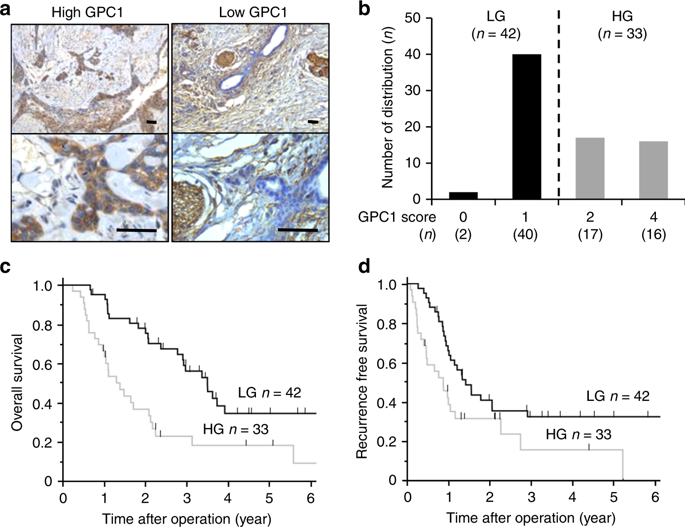当前位置:
X-MOL 学术
›
Br. J. Cancer
›
论文详情
Our official English website, www.x-mol.net, welcomes your
feedback! (Note: you will need to create a separate account there.)
Anti-glypican-1 antibody-drug conjugate is a potential therapy against pancreatic cancer.
British Journal of Cancer ( IF 6.4 ) Pub Date : 2020-03-10 , DOI: 10.1038/s41416-020-0781-2 Takahiko Nishigaki 1, 2 , Tsuyoshi Takahashi 1 , Satoshi Serada 2, 3 , Minoru Fujimoto 2, 3 , Tomoharu Ohkawara 2, 3 , Hisashi Hara 1, 2 , Takahito Sugase 1, 2, 3 , Toru Otsuru 1, 2 , Yurina Saito 1, 2 , Shigehiro Tsujii 4 , Taisei Nomura 5 , Koji Tanaka 1 , Yasuhiro Miyazaki 1 , Tomoki Makino 1 , Yukinori Kurokawa 1 , Kiyokazu Nakajima 1 , Hidetoshi Eguchi 1 , Makoto Yamasaki 1 , Masaki Mori 6 , Yuichiro Doki 1 , Tetsuji Naka 2, 3
British Journal of Cancer ( IF 6.4 ) Pub Date : 2020-03-10 , DOI: 10.1038/s41416-020-0781-2 Takahiko Nishigaki 1, 2 , Tsuyoshi Takahashi 1 , Satoshi Serada 2, 3 , Minoru Fujimoto 2, 3 , Tomoharu Ohkawara 2, 3 , Hisashi Hara 1, 2 , Takahito Sugase 1, 2, 3 , Toru Otsuru 1, 2 , Yurina Saito 1, 2 , Shigehiro Tsujii 4 , Taisei Nomura 5 , Koji Tanaka 1 , Yasuhiro Miyazaki 1 , Tomoki Makino 1 , Yukinori Kurokawa 1 , Kiyokazu Nakajima 1 , Hidetoshi Eguchi 1 , Makoto Yamasaki 1 , Masaki Mori 6 , Yuichiro Doki 1 , Tetsuji Naka 2, 3
Affiliation

|
BACKGROUND
Pancreatic cancer (PDAC) is the most lethal malignancy. New treatment options for it are urgently required. The aim was to develop an antibody-drug conjugate (ADC) targeting glypican-1 (GPC-1) as a new therapy for PDAC.
METHODS
We evaluated GPC-1 expression in resected PDAC specimens and PDAC cell lines. We then measured the antitumour effect of anti-GPC-1 monoclonal antibody conjugated with the cytotoxic agent monomethyl auristatin F (MMAF) in vitro and in vivo.
RESULTS
GPC-1 was overexpressed in most primary PDAC cells and tissues. The PDAC cell lines BxPC-3 and T3M-4 strongly expressed GPC-1 relative to SUIT-2 cells. Compared with control ADC, GPC-1-ADC showed a potent antitumour effect against BxPC-3 and T3M-4, but little activity against SUIT-2 cells. In the xenograft and patient-derived tumour models, GPC-1-ADC significantly and potently inhibited tumour growth in a dose-dependent manner. GPC-1-ADC-mediated G2/M-phase cell cycle arrest was detected in the tumour tissues of GPC-1-ADC-treated mice relative to those of control-ADC-treated mice.
CONCLUSIONS
GPC-1-ADC showed significant tumour growth inhibition against GPC-1-positive pancreatic cell lines and patient-derived, GPC-1-positive pancreatic cancer tissues. Our preclinical data demonstrated that targeting GPC-1 with ADC is a promising therapy for patients with GPC-1-positive pancreatic cancer.
中文翻译:

抗glypican-1抗体-药物偶联物是抗胰腺癌的潜在疗法。
背景技术胰腺癌(PDAC)是最致命的恶性肿瘤。迫切需要新的治疗方法。目的是开发针对Glypican-1(GPC-1)的抗体-药物偶联物(ADC),作为PDAC的新疗法。方法我们评估了切除的PDAC标本和PDAC细胞系中GPC-1的表达。然后,我们在体外和体内测量了与细胞毒剂单甲基澳瑞他汀F(MMAF)偶联的抗GPC-1单克隆抗体的抗肿瘤作用。结果GPC-1在大多数原代PDAC细胞和组织中过表达。相对于SUIT-2细胞,PDAC细胞系BxPC-3和T3M-4强烈表达GPC-1。与对照ADC相比,GPC-1-ADC对BxPC-3和T3M-4具有有效的抗肿瘤作用,但对SUIT-2细胞几乎没有活性。在异种移植和患者来源的肿瘤模型中,GPC-1-ADC以剂量依赖的方式显着有效地抑制了肿瘤的生长。相对于对照ADC处理的小鼠,在GPC-1-ADC处理的小鼠的肿瘤组织中检测到GPC-1-ADC介导的G2 / M期细胞周期停滞。结论GPC-1-ADC对GPC-1阳性胰腺细胞系和患者来源的GPC-1阳性胰腺癌组织具有显着的肿瘤生长抑制作用。我们的临床前数据表明,针对GPC-1阳性胰腺癌患者,ADC靶向GPC-1是一种有前途的疗法。结论GPC-1-ADC对GPC-1阳性胰腺细胞系和患者来源的GPC-1阳性胰腺癌组织具有显着的肿瘤生长抑制作用。我们的临床前数据表明,针对GPC-1阳性胰腺癌患者,ADC靶向GPC-1是一种有前途的疗法。结论GPC-1-ADC对GPC-1阳性胰腺细胞系和患者来源的GPC-1阳性胰腺癌组织具有显着的肿瘤生长抑制作用。我们的临床前数据表明,针对GPC-1阳性胰腺癌患者,ADC靶向GPC-1是一种有前途的疗法。
更新日期:2020-03-10
中文翻译:

抗glypican-1抗体-药物偶联物是抗胰腺癌的潜在疗法。
背景技术胰腺癌(PDAC)是最致命的恶性肿瘤。迫切需要新的治疗方法。目的是开发针对Glypican-1(GPC-1)的抗体-药物偶联物(ADC),作为PDAC的新疗法。方法我们评估了切除的PDAC标本和PDAC细胞系中GPC-1的表达。然后,我们在体外和体内测量了与细胞毒剂单甲基澳瑞他汀F(MMAF)偶联的抗GPC-1单克隆抗体的抗肿瘤作用。结果GPC-1在大多数原代PDAC细胞和组织中过表达。相对于SUIT-2细胞,PDAC细胞系BxPC-3和T3M-4强烈表达GPC-1。与对照ADC相比,GPC-1-ADC对BxPC-3和T3M-4具有有效的抗肿瘤作用,但对SUIT-2细胞几乎没有活性。在异种移植和患者来源的肿瘤模型中,GPC-1-ADC以剂量依赖的方式显着有效地抑制了肿瘤的生长。相对于对照ADC处理的小鼠,在GPC-1-ADC处理的小鼠的肿瘤组织中检测到GPC-1-ADC介导的G2 / M期细胞周期停滞。结论GPC-1-ADC对GPC-1阳性胰腺细胞系和患者来源的GPC-1阳性胰腺癌组织具有显着的肿瘤生长抑制作用。我们的临床前数据表明,针对GPC-1阳性胰腺癌患者,ADC靶向GPC-1是一种有前途的疗法。结论GPC-1-ADC对GPC-1阳性胰腺细胞系和患者来源的GPC-1阳性胰腺癌组织具有显着的肿瘤生长抑制作用。我们的临床前数据表明,针对GPC-1阳性胰腺癌患者,ADC靶向GPC-1是一种有前途的疗法。结论GPC-1-ADC对GPC-1阳性胰腺细胞系和患者来源的GPC-1阳性胰腺癌组织具有显着的肿瘤生长抑制作用。我们的临床前数据表明,针对GPC-1阳性胰腺癌患者,ADC靶向GPC-1是一种有前途的疗法。











































 京公网安备 11010802027423号
京公网安备 11010802027423号